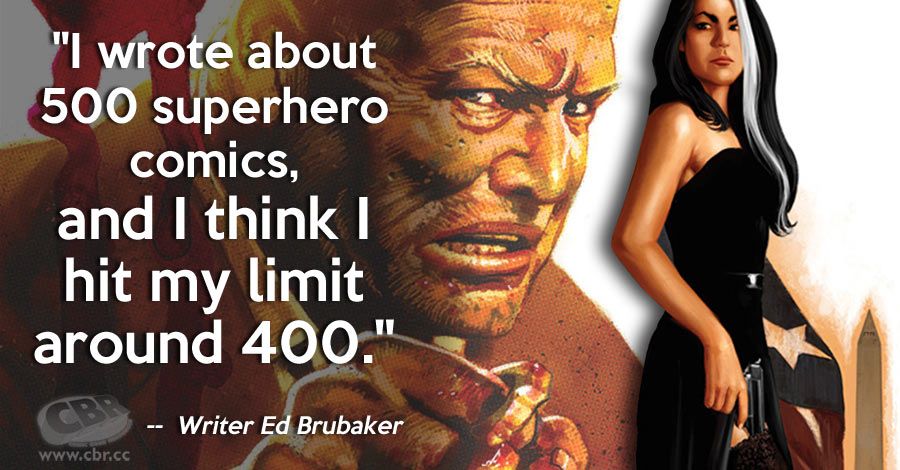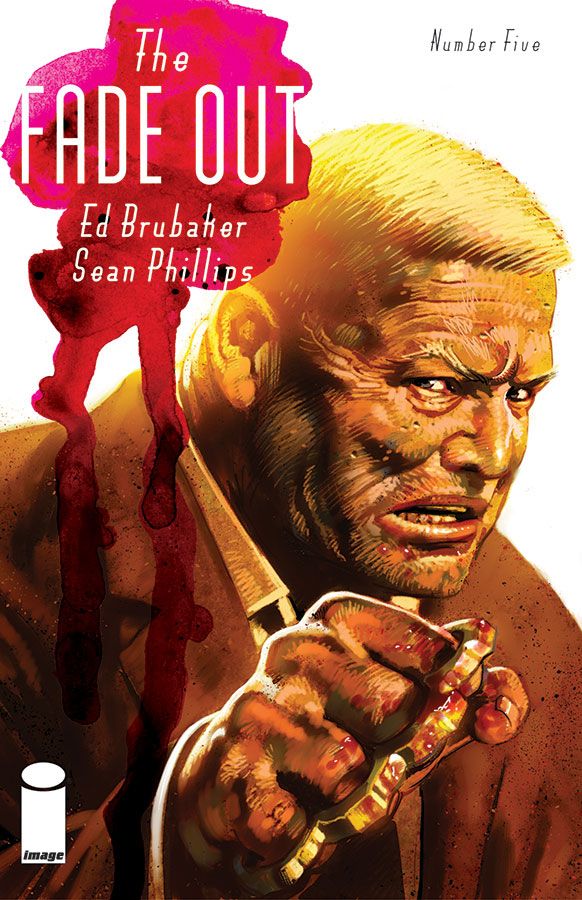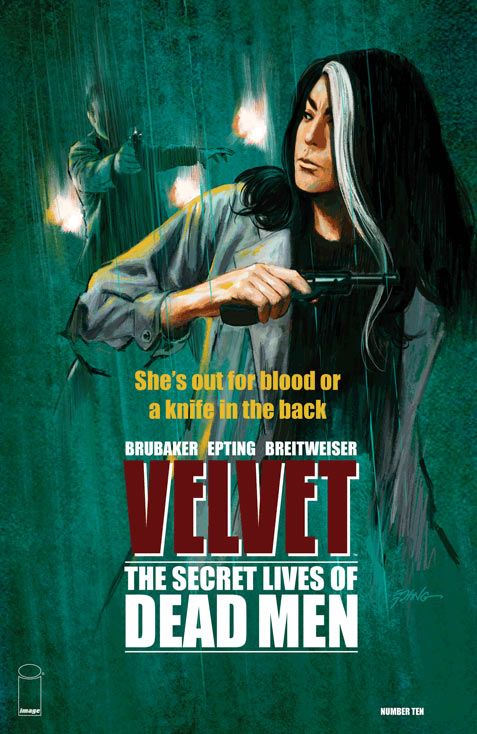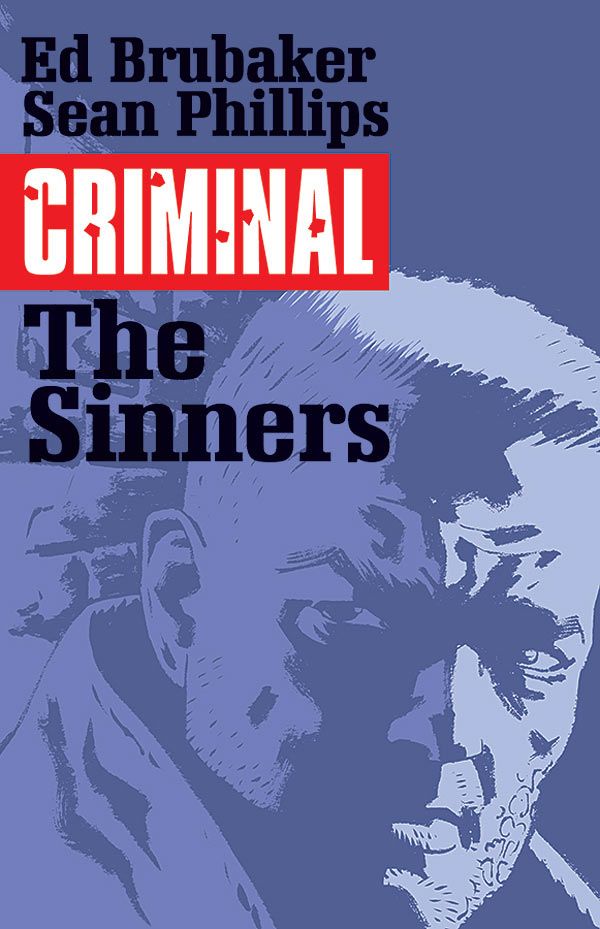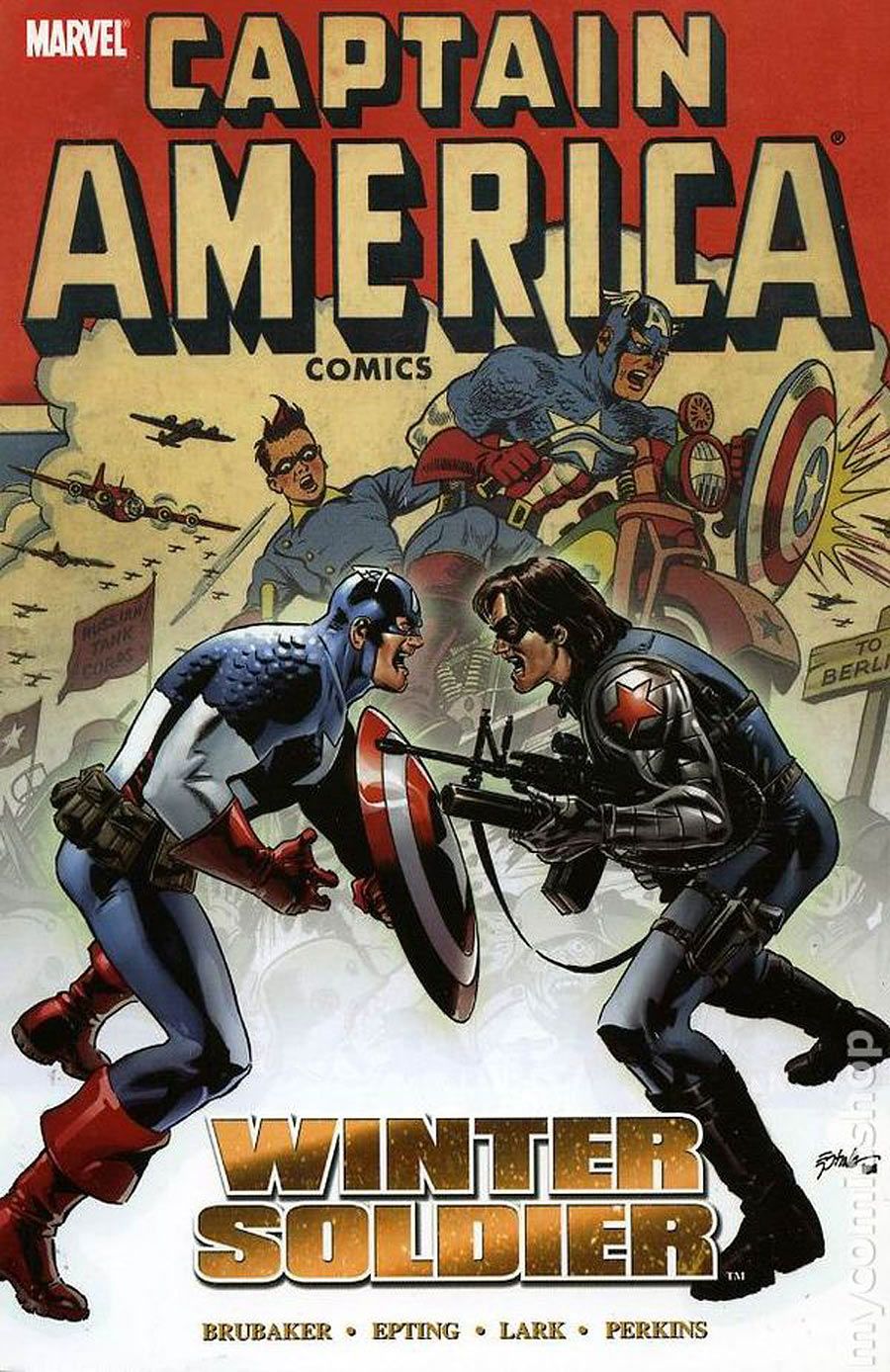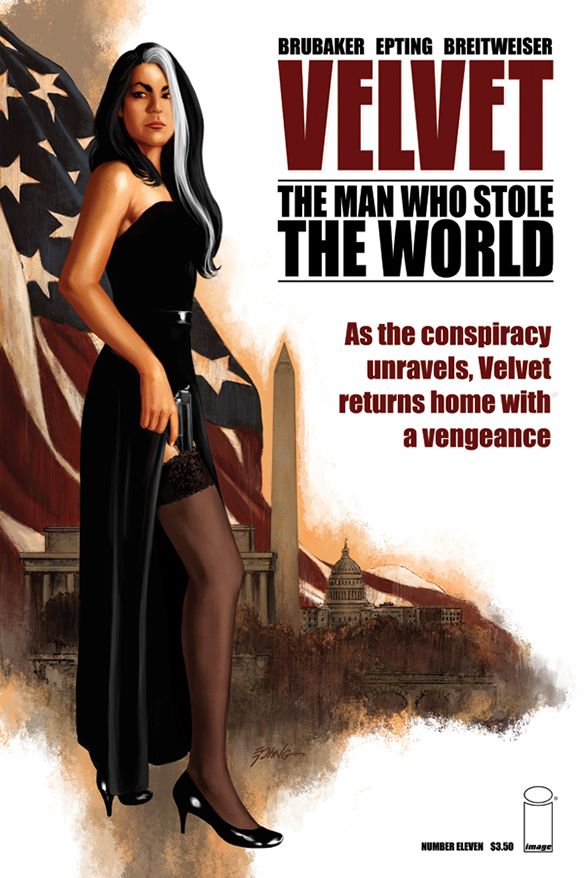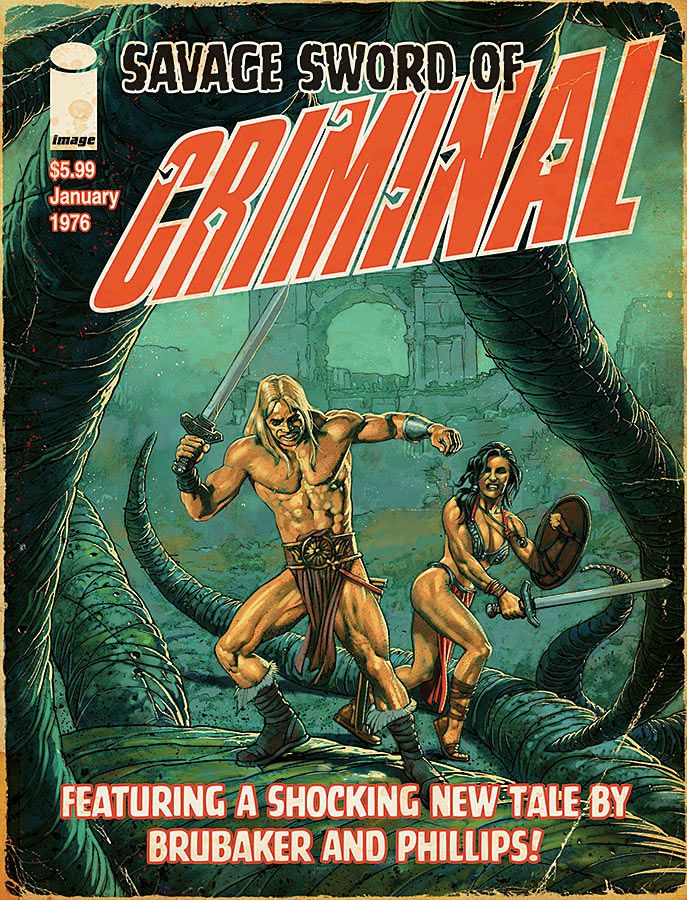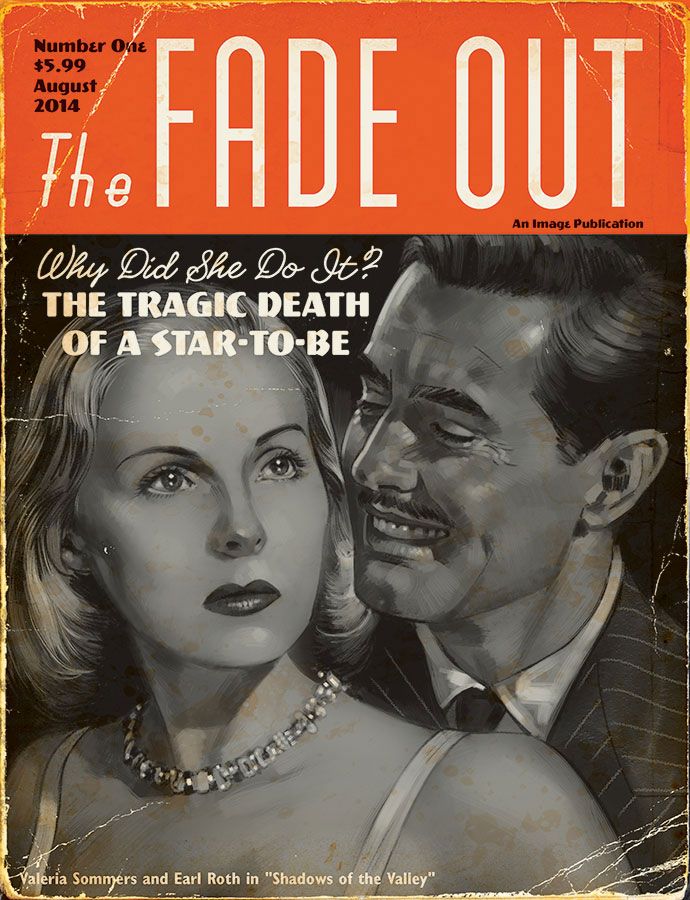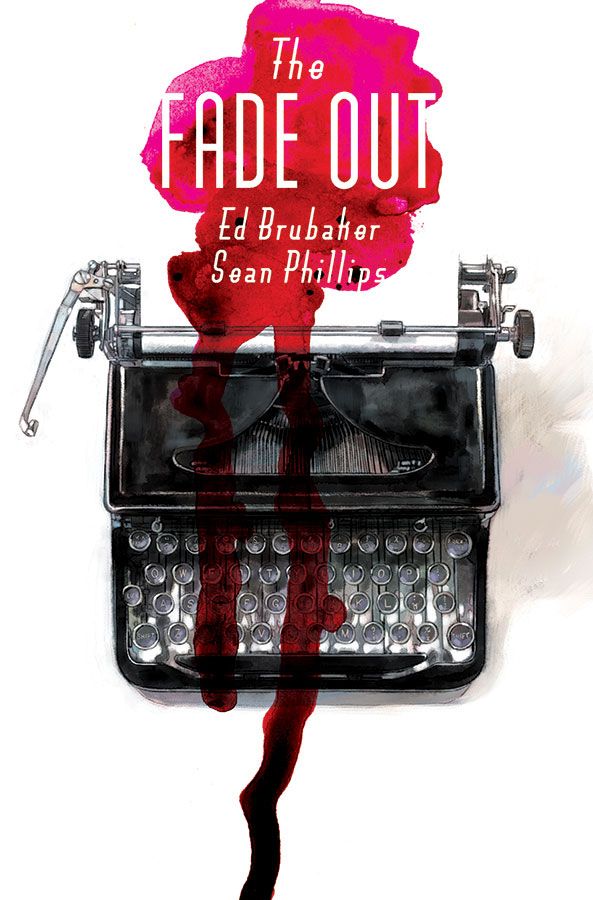After a decade as one of the industry's most prominent writers of superhero comics -- with extensive stints at both Marvel and DC Comics on marquee titles including "Captain America," "Uncanny X-Men" and "Gotham Central" -- Ed Brubaker moved on from the genre a couple years ago, to focus his comics-writing energies solely on creator-owned projects, something he's pursued since the earliest days of his career. As he puts it: "I wrote about 500 superhero comics, and I think I hit my limit around 400."
And it's paid off. "Fatale," which he launched in 2012 with longtime collaborator Sean Phillips and wrapped last year, was a hit; as was "Velvet," an espionage comic co-created with artist Steve Epting, who he worked with extensively on "Captain America." In early 2014, Image Comics announce a unique arrangement with Brubaker and Phillips, a five-year deal where the duo have "total freedom, total control and total ownership" over their works at the publisher -- with the first product being "The Fade Out" which Brubaker shares is the team's most successful book together yet.
Last week at WonderCon in Anaheim, CBR News sat down for a frank and wide-ranging interview with Brubaker -- highlighted by the news that in addition to his comic book work, he's also working as a writer on an HBO series that he can't yet reveal. Brubaker also discussed the influence that creator-owned works currently have on comics as a whole, why he doesn't miss writing superhero comics and how magazine editions of "Criminal" and "The Fade Out" (of which issue #5, the start of the series' second act, is out today) are an extension of his ongoing love of the print format's distinct charms.
CBR News: Ed, was looking through your Twitter a bit before this interview, and saw that you now have a day job in TV? Not sure how much you can talk about it at this point, but any insight you can share?
Ed Brubaker: I'm kind of not supposed to talk about it, really. It's not something I created. I'm working on an HBO show, I'm a supervising producer on a show that's debuting later this year. It's a totally different thing for me. I'm so used to just doing my own thing. My other TV development stuff that I've done has always been me writing TV pilots, and having them not get made, but getting paid for it.
I got offered this job for this huge show, and I was like, "OK, yeah, sure, I'll go work on something that's already got a full season greenlit, and get to see how TV production actually works." I got a really great position to start with; I didn't have to start at the lowest rung, because I have tons of experience in comics, and have written movies and TV shows that haven't gotten made yet. It's been really great. I get up at 6 in the morning and I write my comics for like three hours, and then I go into a day job. I'm asleep by 10 every night right now.
It's interesting. The structure's been really good for me. We have no phones or computers in the writers' room -- my attention span has totally come back. I really thought I had slowly developed ADD, but it turned out I was just looking at the Internet all the time and checking my email. Once you're untethered from that? Now I'm reading more books, I'm looking at the Internet in general so much less, and I feel so much mentally healthier from that. But it's a lot of work to carry.
That has to be a huge change for you, just schedule-wise, having more of a routine.
Oh yeah. I couldn't come down here because I was working on Friday. I was in an office on Friday. I have my own office, at an office. [Laughs] It's kind of nuts. I literally have to go into work. I'm just so used to working at home, for like, 20 years. My last job that wasn't at home was at a bookstore on Castro Street in the '90s.
And working on an HBO show has to be exciting -- they have a pretty good track record.
I'm working with amazing people. Everyone that's involved is fantastic. It's HBO, it's one of the best places to have anything right now.
You've been moving towards TV work for a while, though, right? You've been living in LA for a few years.
I've been down there for like three years. That's why I went down there -- I was having so many development deals and movie jobs and TV jobs that were offered but I couldn't take, because I wasn't there. I just wanted to go down and actually pursue that stuff. One of the many reasons I stopped writing superhero comics is I thought I could take the amount of time I was putting into that and put it into something else. You always just want to reach a wider audience. The goal, obviously, is to eventually write your own movies or TV shows if you're going to work in that field.
But I'll tell you -- working in Hollywood has made me appreciate my comics job a lot. No one gives me notes, I don't have to involve a lot of people in the process. I love the hours of my day when I get to sit and write my comics. I think I appreciate them more now than I did when it was my full-time job. So I have two full-time jobs, and in one of them, I get to completely be the boss, and another one, I come up with ideas I really love, but ultimately there are so many people involved in the process -- I had a pilot for NBC a couple years ago, but by the time I turned it in, it was so different from what I wanted to do, it was a relief when they didn't do it.
And speaking of you no longer writing superhero comics -- at this point it's been more than two years that you've been away from that side of things, right?
I think the last superhero comic I wrote was in 2012, but I think it got published in 2013 -- the last issue of "Winter Soldier" I did. It's been like three years of not having to write superhero comics.
How's that feeling at this point? You and Sean Phillips have a very unique and creatively liberating deal at Image -- how satisfying is it for you, being able to focus your comics work only on these creator-owned ideas?
It's amazing. That deal with Image has changed my life in a big way, because I now no longer worry -- even though I was always doing my own stuff on the side while doing the superhero stuff, when we first started "Criminal," I was paying everybody out of pocket to do the art and coloring. I was always worrying about making my money back: "Is this going to do well enough?" "Is this idea commercial enough?" Worrying about stuff other than what we wanted to do. Now I don't have to worry about that.
I probably wouldn't have done "The Fade Out" [otherwise] -- I just write a comic that I want to write, and let Sean draw it, and Image will deal with selling it to people. I don't have to pitch it to [Image Publisher] Eric [Stephenson]. I can do any project I want to do. If I want to do a fantasy comic, I can do a fantasy comic; I want to do a romance comic, I can do that.
And you should do both of those things!
Well, we did just do that "Criminal" one-shot, that had like 15 pages of fantasy comic in it. That was a lot of fun. That whole package, doing the magazine-sized variants -- all that's just part of the Image deal. We're allowed to do whatever we want, including format. They don't have a veto, they just have to publish it.
Also, "The Fade Out" is the biggest thing we've ever done. And I thought it was the least commercial idea I've ever had, because it's people in the '40s talking about movies. I mean, there's a murder, and lots of sex and weird shit going on, but honestly, the pitch is basically, "It's a '40s period piece." You don't see a ton of those. [Laughs] I didn't think there was a huge audience crying out for a '40s, Hollywood murder-mystery comic, but that was what I really wanted to write, and had been wanting to write for a few years. I just said, "That's what I'm going to do."
I had been thinking about a sci-fi idea, that maybe that would be the thing we should do. I'm glad we didn't, because the next Image Expo, almost everything that got announced was a sci-fi book. So our book really stands on on the stands now. It looks different. The only thing even close to it is "Satellite Sam," which is '50s New York, thank god. [Laughs] It's been amazingly liberating. I think the creative freedom would be crippling if I didn't have Sean needing a script every month. That's the part where the collaboration really helps, because I can't just sit there and agonize over every decision -- I have to pull the trigger eventually, and write the next scene.
The Image deal is so fantastic. This year, already, has been my best year financially in comics, ever. And it's only three months in. I've made more money from Image than I made last year when the "Winter Soldier" movie was out, on "Captain America" books. Image is doing amazingly right now. The first issue of "The Fade Out," we ended up selling over 60,000 copies, including the magazine, which sold like 11,000 copies. And that was why I felt, "OK, let's do a 'Criminal' magazine then, too." That's been a huge hit, too. People got really into the comics-sized version, and then they discovered there was a magazine-sized version that had extra stuff in it. A certain audience was really into that replica of the '70s aspect of it.
With "The Fade Out" launching so huge, it's also a sign of what we're seeing among readers in the industry -- creator-owned comics have a wider audience now. In general people seem to be more accepting of them, given how many successes that Image has had recently. And that has to be satisfying, as someone who's been doing creator-owned since the beginning of your comics career.
Yeah, I started out writing and drawing my own comics, 20-something years ago, and now I'm doing my own comics with other artists. When I come to the conventions and see the panels, half the people in the audiences are women, and they all bring up their comics afterwards for me to sign. I feel like this new generation is much more interested in just reading what they like, following creators, and discovering new things. They're not as interested in the revamps of the same characters over and over again. They may like that stuff, too, but they like "Hawkeye" more than they like "The Avengers," or something. They want something they can digest, and they don't have to read a whole line of books.
When I go to the comic book store now, I pretty much only buy creator-owned books, and the odd Marvel or DC thing that a friend of mine's doing that I really like. But I never buy anything that's tied into a crossover. When I was a kid, even -- I stopped reading Marvel Comics as a kid after "Secret Wars," because I was like, "I hate that crossover." I was its target audience, but I was like, "No, don't like this, it's just bullshit to trick everybody into buying every book." And those are always the worst stories. Even the best crossover's still not as good as anything else that the people who did it did. As big as "Civil War" was, it's still not as good as "Starlight." It's not as good as "Wanted," where [Mark] Millar could just do his own thing. Even the best crossovers are still not as good as what their creators do on their own stuff. Like [Brian Michael] Bendis has done a ton of crossovers, and none of them are as good as "Ultimate Spider-Man." Even though they sell way better. It's just an odd thing. And I'm not saying they're bad! I'm not saying Bendis and Mark did a bad job. I'm just saying, even the best crossover is still a crossover. There are too many moving parts. There are too many other people's voices. It's not a singular vision, and I love a singular vision. I started following creators when I was like 8 years old. I started reading the credits and going, "Oh, I like this artist," "I like this writer." That's always been my thing, because I always identified with someone who was going to draw or write comics.
We're also seeing a change with creators' career paths -- for a long time it seemed like someone would have success with a creator-owned, independent comic, and then they'd write for Marvel or DC, and that was it. You've reached it. Now we're seeing people who have been successes at Marvel and DC choose to step away from that to focus solely on creator-owned material, and have it pay off very well for them.
Yeah. I always had my own thing. At least one of the things I was working on, I at least owned part of -- like "Sleeper," Sean and I have a stake in. I'm grateful for Marvel and DC for giving me all that work, because it helped me build an audience. Like what me and Greg [Rucka] were doing on "Gotham Central," what I was doing on "Catwoman;" "Captain America," obviously, has helped me build a huge audience. But I also did a very creator-driven version of "Captain America." I got really lucky that I arrived at a time when they were willing to let creators bring their voice to the book. I don't think I could have done it otherwise.
You realize you're building and this audience, and you start doing your creator-owned stuff on the side, and a lot of that audience is going over to that. You're never going to get 100 percent of the people who loved me on "Captain America" buying my creator-owned stuff, because a lot of those people just like characters, and they're just Marvel and DC readers, and they don't branch out to other stuff. But a lot of them do. More and more, and that audience grows. We're re-releasing the "Criminal" trades through Image now with new designs, and almost everyone I've met at this convention that has brought them up to sign never read them the first time. They're discovering it because they're reading "The Fade Out," or they liked "Fatale," and now they're picking up everything Sean and I have done. Every project we do sells better than the last one now, and it's not that more of our old readers are coming back. There's just a bunch of new people who are reading comics now. It's pretty fucking amazing.
I feel like, in some ways, it's one of the few times I've been at the right place at the right time. Which is what I thought when "Fatale" came out, and now I think "Fatale" came out a couple years too early, almost. Brian Vaughan and I were talking the other day -- "Fatale" came out, and then "Saga" came out a couple months later. Suddenly, after that, it was like a floodgate opened of all these people going, "Hey, we can go to Image." I certainly was calling up a lot of friends -- "Hey, Image is starting to be on fire right now. It's a good time to be there." Now, Image #1s are insane. We sold so many copies of "The Fade Out" that I couldn't believe it. I was just like, "Is this correct? We sold more of this than we did on 'Velvet.'" Which his insane. But that's how it goes.
So you don't miss the superhero stuff?
No. I wrote about 500 superhero comics, and I think I hit my limit around 400. I just kept doing it, because I was really enjoying doing it, but I was starting to get to the point -- especially when I would write team books, it was a bigger struggle for me. Even "Secret Avengers," which I created the idea for and pitched, because I thought that would be "my" superhero team -- just the way superhero teams work for me, I just structurally couldn't get my brain to fit around them correctly. I was never happy with any team book I had to write. But you look at "Captain America," and it's clearly a team book, but you don't have to have everyone in every issue. But clearly it was an ensemble cast.
Honestly, it came down to, when I was writing my own stuff, I was struggling to figure out how to end stories, because the end of very superhero comic is, people put on costumes and go punch each other, and whoever's right, wins. That's just weird. You write like 500 of those... That was why I had fun on "Captain America," because he could lose in my version.
He died in your version!
It was a story about tragedies and redemptions. It was much different for a standard superhero comic for me, as a writer. It literally got to the point where I was having trouble figuring out what the ending of a story was anymore -- also, I was doing stories that had no end.
I think between "Winter Solider," and "Captain America," and all the specials and stuff, I did about 125 comics about Captain America and his world. That was a lot, and I was really proud of that. I love all those books. I love "Gotham Central." I'm glad that DC hasn't brought it back as part of the New 52, because I think I would not be happy with that at all, just because it wouldn't be us.
I haven't missed it, for sure. I work with three artists -- Elizabeth Breitweiser, and Sean and Steve, and that's it. I have very few people that I have to deal with. I know the artists that I'm writing for, I know exactly how to write for them. There's never for a fill-in issue. I feel like we're able to be artists, and just do our own thing. It's not about churning out cans. There isn't a fill-in issue, ever. There never will be. It was weird, because I could tell with "Velvet" in the early days, a lot of our "Captain America" readers were coming over who never read a non-superhero book before, because we'd get letters where people were worrying that there might be a fill-in artist someday if Steve was too slow. "No, Steve's the co-creator of the book. No one else will ever draw it. It will never be done by anyone bedsides us."
Another thing I wanted to get your take on -- with the magazine editions you've been doing, it reminds me of when you were first putting the backmatter into "Criminal," to entice people to get the single issues rather than wait for the trade. Things like the magazine editions of "Savage Sword of Criminal" and "The Fade Out" seem like a way to get people to pick up print copies rather than digital, as I know you're a supporter of print.
Yeah, I prefer print to digital. Digital's fine -- the colors look amazing in digital. You can reach anybody with it. We include the backmatter stuff in the digital comics now, too, but we didn't used to, because I felt like they're cheaper, and I felt like it would be punishing the people who paid like 50 cents more. But now we're doing so well in print, and the digital does OK. I don't think any comic does as well digitally as it does in print, still -- maybe "Ms. Marvel." There are outliers here and there. Even "The Walking Dead" sells way more in print than it does digital.
It's not that I'm against digital. I just love print. I grew up on print, I buy books, I buy vinyl. I like things. I like being able to go to someone's house and look at their books and records and comics. I don't want to thumb through someone's iPad. I like to be able to make a snap judgment about someone's taste. I'm not going to grab your phone and go, "What have you got?" Also, people on their phone, in their music section, have everything. They don't have just the stuff they like, they have shit that they stole. [Laughs] For me, the magazines are a way of making the print thing stand out even more, and be like a unique work of art. It's like an art book. That's why you'll see those Artist's Editions doing so well, and all those deluxe hardbacks do so well now -- it's because the print becomes an artifact, almost. It becomes something you couldn't reproduce digitally, at all.
I always want every comic to be worth more than people are paying for it. I try to make sure all of our comics take a long time to read -- that's why there's a lot of text in them, and there's a lot of stuff going on, and then there are articles in the back usually; letters pages. I want people to feel like they're getting something that's really, really worth their money, as opposed to a 20-page comic that costs five dollars that you read in two minutes. I personally can't do that. As much as I love some of that stuff -- I'm just like, "I'll wait for the trade, where it won't have ads every third page." I know how their economy works -- there's no reason if you're selling a million copies of something, you need to pay five dollars for 20 pages of contents. I love print, and I love comics, and I want all of my comics to be something that feels special when you buy it.
We always still get people complaining that we don't include the articles in the trade paperbacks. The articles aren't related to the story. They're just some extra stuff that's cool, that I'm interested in, that I hope readers are interested in. I'm not punishing you for buying the trade instead. When you're buying the trade, you're buying the comics story that we serialized in the single issue. You buy the single issues, you get some extras, too. We reward our early adopters, because their buying the book makes that trade possible. We don't have a giant corporation backing us. Image is a small company that has like 15 employees. They take a really tiny piece of the pie. We don't have a company looking at it going, "How much can we make off of this?" They make the same when we sell a hundred thousand as when we sell 10. I love comics, I love single issues. I go to the comics store every week and buy comics. It's all about rewarding the people who are making stuff possible.
"The Fade Out" #5 is on sale now; "Velvet" #10 is scheduled for release on April 22, both from Image Comics.

